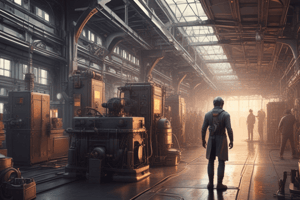Podcast
Questions and Answers
In the late 1700s, Great Britain's many rivers, harbors, and other natural resources caused the Industrial Revolution to:
In the late 1700s, Great Britain's many rivers, harbors, and other natural resources caused the Industrial Revolution to:
- Stabilize
- Grow (correct)
- Slow down
- Decrease
How did innovations in manufacturing lead to improvements in transportation?
How did innovations in manufacturing lead to improvements in transportation?
Goods were produced efficiently and needed more efficient transportation.
Which became popular forms of entertainment in the late 1800s? (Check all that apply)
Which became popular forms of entertainment in the late 1800s? (Check all that apply)
- Spectator sports (correct)
- Gyms
- Vaudeville (correct)
- Mass-market books (correct)
- Motion pictures (correct)
- Television
Events following the Civil War resulted in:
Events following the Civil War resulted in:
Based on the graph, what conclusion can be drawn about Germany?
Based on the graph, what conclusion can be drawn about Germany?
Which describes tenant farmers?
Which describes tenant farmers?
The Second Industrial Revolution in the United States resulted in the rapid growth of:
The Second Industrial Revolution in the United States resulted in the rapid growth of:
In terms of production, socialism advocated for:
In terms of production, socialism advocated for:
Philosopher Adam Smith is known as the:
Philosopher Adam Smith is known as the:
By 1900, Germany's steel production exceeded all other countries except:
By 1900, Germany's steel production exceeded all other countries except:
Who created utopianism?
Who created utopianism?
Adam Smith is the author of what influential book?
Adam Smith is the author of what influential book?
Flashcards are hidden until you start studying
Study Notes
Industrial Revolution Overview
- Great Britain's natural resources, including rivers and harbors, facilitated the growth of the Industrial Revolution in the late 1700s.
- Innovations in manufacturing improved efficiency, leading to a greater demand for effective transportation solutions.
Entertainment in the Late 1800s
- Popular forms of entertainment included spectator sports, vaudeville, motion pictures, and mass-market books, reflecting cultural changes of the era.
Effects of the Civil War
- The events following the Civil War marked the beginning of the Second Industrial Revolution in the United States, accelerating industrial progress.
Railway Expansion
- By 1880, Germany surpassed both Great Britain and Russia in the number of rail lines, indicating significant railway development.
Tenant Farmers
- Tenant farmers are individuals who farm land owned by another party, illustrating land ownership dynamics in agriculture.
Urban Growth
- The Second Industrial Revolution spurred rapid urbanization in the United States, as cities expanded to accommodate industrial growth.
Socialism and Production
- Socialism emphasizes government control over production as a means to improve working conditions and manage resources effectively.
Key Economic Theorists
- Adam Smith is recognized as the father of capitalism, promoting free markets and individual entrepreneurship.
Steel Production in Germany
- By 1900, Germany emerged as a leading steel producer, with output only surpassed by the United States, highlighting its industrial capacity.
Utopianism's Origin
- Robert Owen is credited with founding utopianism, advocating for idealistic community designs and cooperative living.
Influential Literature
- Adam Smith authored "The Wealth of Nations," a foundational text in economic theory that laid the groundwork for capitalist principles.
Studying That Suits You
Use AI to generate personalized quizzes and flashcards to suit your learning preferences.




